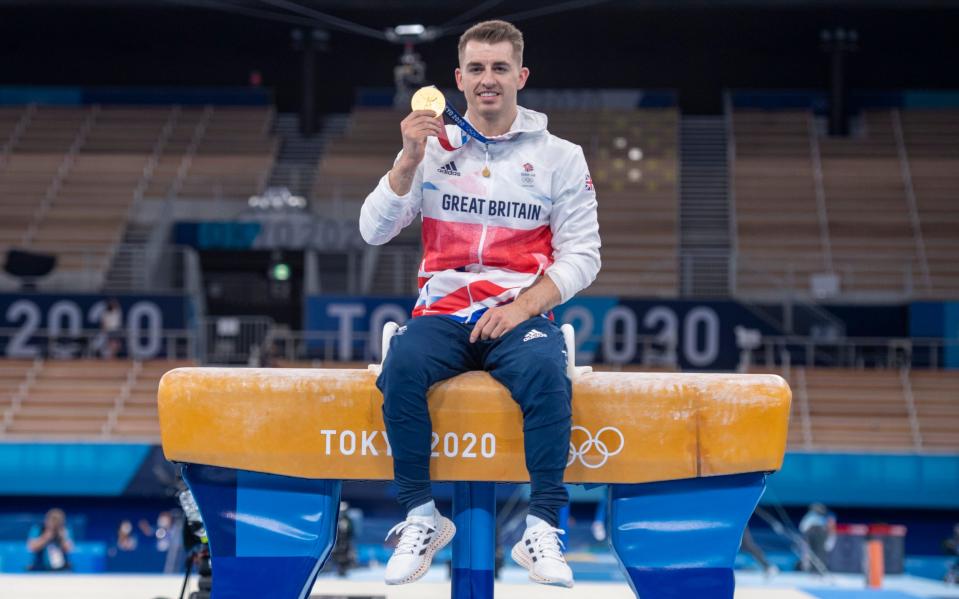How lockdown garden practice and fatherhood honed Max Whitlock's Olympic charge

Ask a layman which gymnastics apparatus gives off the most terrifying vibe, and they will probably go for the rings – where the crucifix is an essential pose – or the beam on the women’s side.
Few would mention the pommel horse. It has a friendly look about it: a couch on legs, topped off by the sort of safety handles you normally see in a hospital bathroom. But in fact this represents the greatest high-wire act in the sport. More athletes come to grief on the pommel than anywhere else, as Ireland’s Rhys McClenaghan reminded us this morning with his unscheduled dismount.
It feels appropriate, then, that the pommel has become Max Whitlock’s forte. Because Britain’s greatest gymnast shares the same unassuming, deceptive quality.
Anyone watching his BBC interview on Sunday might have thought “How charming he is – the perfect next-door neighbour.” Underneath the everyman exterior, though, lies the iciest streak of competitive focus. There’s no other way to explain a remarkable score of 15.583 when defending his Olympic title. In this sport, a winning margin of 0.183 is almost like lapping your fellow competitors.
To deliver his toughest-ever routine so perfectly was all the more astonishing when Whitlock and his fellow British gymnasts had been reduced to practising at home for 12 weeks during the height of the pandemic last year.
Whitlock himself set up a pommel horse in his garden in Essex, where he rehearsed his spindles and his flares while coach Scott Hann observed on a video link. Great Britain’s lockdowns placed them at a major disadvantage when compared to the Russians, such as fourth-placed David Belyavsky, who were able to keep training at their normal bases throughout.
This gold feels all the more resonant because the pommel has stood at the centre of the British gymnastics revolution. In his book The Talent Lab, Owen Slot wrote that Britain’s men used to be “such notorious flops in one particular discipline, the pommel, that, at junior or senior level, no Briton had won a medal ever.”
It was Paul Hall, an ambitious young coach, who began changing the culture in the 1990s by asking his young gymnasts to spin endless pommel-horse circles. One of his students, Louis Smith, went on to become a trailblazer: a sort of John the Baptist figure for Whitlock. As for Hall, he is now British Gymnastics’ head coach.
What with Covid and the devastating revelations of athlete abuse within this sport, few had expected Whitlock and his comrades to repeat their excellence from Rio five years ago. Insiders at British Gymnastics were privately braced for the sort of recession that afflicted rowing last week.
Yet the British women excelled themselves on Tuesday with their morale-boosting bronze in the team event. And now Whitlock has earned this vital gold. Only those damn Russians – with their undisturbed training schedule and their twin successes in the team events – have collected multiple golds to date.
When you think about all the challenges Whitlock has faced – including the extra year’s wait – this result feels all the more remarkable. His life has certainly expanded since he became a father to Willow two years ago. And yet, the experience has made him all the more eager to keep training.
It is perhaps fortunate for British gymnastics fans that this medal has come too early for Willow to watch her dad compete – or at least to remember the final – as that is his stated ambition. As he admitted last week, “She’s probably more interested in Paw Patrol if that’s on instead or playing outside.”
In a metaphorical sense, Whitlock has also become a father figure to emerging young gymnasts such as Joe Fraser – who will go in Tuesday’s parallel bars final – and Giarnni Regini-Moran. Apart from handing out useful tips on preparation and psychology, he has posted photos of himself trimming his team-mates’ hair in Tokyo under the caption “Whitlock’s Olympic barbers.”
So what next for Whitlock? Even before this result, he had laid down his intention to compete in Paris in three years’ time. Before that, he hopes to add his name to the Code of Points. If you introduce an unprecedented move in competition, it goes down on the list as a Biles, say, or a Tweddle. The Whitlock is now in development.
“It’s a skill that if I do complete it, it would be the hardest to perform on pommel horse – the first flighted element,” he said in May.
“It’s a crowd-pleaser with plenty of wow factor,” Whitlock added. The same could surely be said of the man himself.

 Yahoo Sport
Yahoo Sport 





































